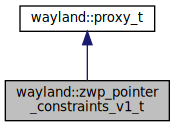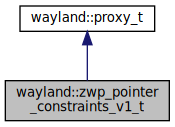constrain the movement of a pointer More...
#include <wayland-client-protocol-unstable.hpp>


Public Types | |
| enum | wrapper_type { wrapper_type::standard, wrapper_type::display, wrapper_type::foreign, wrapper_type::proxy_wrapper } |
Public Member Functions | |
| zwp_locked_pointer_v1_t | lock_pointer (surface_t surface, pointer_t pointer, region_t region, zwp_pointer_constraints_v1_lifetime lifetime) |
| lock pointer to a position More... | |
| zwp_confined_pointer_v1_t | confine_pointer (surface_t surface, pointer_t pointer, region_t region, zwp_pointer_constraints_v1_lifetime lifetime) |
| confine pointer to a region More... | |
| uint32_t | get_id () const |
| Get the id of a proxy object. More... | |
| std::string | get_class () const |
| Get the interface name (class) of a proxy object. More... | |
| uint32_t | get_version () const |
| Get the protocol object version of a proxy object. More... | |
| wrapper_type | get_wrapper_type () const |
| Get the type of a proxy object. More... | |
| void | set_queue (event_queue_t queue) |
| Assign a proxy to an event queue. More... | |
| wl_proxy * | c_ptr () const |
| Get a pointer to the underlying C struct. More... | |
| bool | proxy_has_object () const |
| Check whether this wrapper actually wraps an object. More... | |
| operator bool () const | |
| Check whether this wrapper actually wraps an object. More... | |
| bool | operator== (const proxy_t &right) const |
| Check whether two wrappers refer to the same object. More... | |
| bool | operator!= (const proxy_t &right) const |
| Check whether two wrappers refer to different objects. More... | |
| void | proxy_release () |
| Release the wrapped object (if any), making this an empty wrapper. More... | |
Static Public Attributes | |
| static constexpr std::uint32_t | lock_pointer_since_version = 1 |
| Minimum protocol version required for the lock_pointer function. More... | |
| static constexpr std::uint32_t | confine_pointer_since_version = 1 |
| Minimum protocol version required for the confine_pointer function. More... | |
Detailed Description
constrain the movement of a pointer
The global interface exposing pointer constraining functionality. It exposes two requests: lock_pointer for locking the pointer to its position, and confine_pointer for locking the pointer to a region.
The lock_pointer and confine_pointer requests create the objects wp_locked_pointer and wp_confined_pointer respectively, and the client can use these objects to interact with the lock.
For any surface, only one lock or confinement may be active across all wl_pointer objects of the same seat. If a lock or confinement is requested when another lock or confinement is active or requested on the same surface and with any of the wl_pointer objects of the same seat, an 'already_constrained' error will be raised.
Definition at line 2141 of file wayland-client-protocol-unstable.hpp.
Member Enumeration Documentation
◆ wrapper_type
|
stronginherited |
Underlying wl_proxy type and properties of a proxy_t that affect construction, destruction, and event handling
| Enumerator | |
|---|---|
| standard | C pointer is a standard type compatible with wl_proxy*. Events are dispatched and it is destructed when the proxy_t is destructed. User data is set. |
| display | C pointer is a wl_display*. No events are dispatched, wl_display_disconnect is called when the proxy_t is destructed. User data is set. |
| foreign | C pointer is a standard type compatible with wl_proxy*, but another library owns it and it should not be touched in a way that could affect the operation of the other library. No events are dispatched, wl_proxy_destroy is not called when the proxy_t is destructed, user data is not touched. Consequently, there is no reference counting for the proxy_t. Lifetime of such wrappers should preferably be short to minimize the chance that the owning library decides to destroy the wl_proxy. |
| proxy_wrapper | C pointer is a wl_proxy* that was constructed with wl_proxy_create_wrapper. No events are dispatched, wl_proxy_wrapper_destroy is called when the proxy_t is destroyed. Reference counting is active. A reference to the proxy_t creating this proxy wrapper is held to extend its lifetime until after the proxy wrapper is destroyed. |
Definition at line 105 of file wayland-client.hpp.
Member Function Documentation
◆ c_ptr()
|
inherited |
Get a pointer to the underlying C struct.
- Returns
- The underlying wl_proxy wrapped by this proxy_t if it exists, otherwise an exception is thrown
◆ confine_pointer()
| zwp_confined_pointer_v1_t zwp_pointer_constraints_v1_t::confine_pointer | ( | surface_t | surface, |
| pointer_t | pointer, | ||
| region_t | region, | ||
| zwp_pointer_constraints_v1_lifetime | lifetime | ||
| ) |
confine pointer to a region
- Parameters
-
surface surface to lock pointer to pointer the pointer that should be confined region region of surface lifetime confinement lifetime
The confine_pointer request lets the client request to confine the pointer cursor to a given region. This request may not take effect immediately; in the future, when the compositor deems implementation- specific constraints are satisfied, the pointer confinement will be activated and the compositor sends a confined event.
The intersection of the region passed with this request and the input region of the surface is used to determine where the pointer must be in order for the confinement to activate. It is up to the compositor whether to warp the pointer or require some kind of user interaction for the confinement to activate. If the region is null the surface input region is used.
The request will create a new object wp_confined_pointer which is used to interact with the confinement as well as receive updates about its state. See the the description of wp_confined_pointer for further information.
Definition at line 5310 of file wayland-client-protocol-unstable.cpp.
◆ get_class()
|
inherited |
Get the interface name (class) of a proxy object.
- Returns
- The interface name of the object associated with the proxy
◆ get_id()
|
inherited |
◆ get_version()
|
inherited |
Get the protocol object version of a proxy object.
Gets the protocol object version of a proxy object, or 0 if the proxy was created with unversioned API.
A returned value of 0 means that no version information is available, so the caller must make safe assumptions about the object's real version.
display_t will always return version 0.
- Returns
- The protocol object version of the proxy or 0
◆ get_wrapper_type()
|
inlineinherited |
Get the type of a proxy object.
Definition at line 288 of file wayland-client.hpp.
◆ lock_pointer()
| zwp_locked_pointer_v1_t zwp_pointer_constraints_v1_t::lock_pointer | ( | surface_t | surface, |
| pointer_t | pointer, | ||
| region_t | region, | ||
| zwp_pointer_constraints_v1_lifetime | lifetime | ||
| ) |
lock pointer to a position
- Parameters
-
surface surface to lock pointer to pointer the pointer that should be locked region region of surface lifetime lock lifetime
The lock_pointer request lets the client request to disable movements of the virtual pointer (i.e. the cursor), effectively locking the pointer to a position. This request may not take effect immediately; in the future, when the compositor deems implementation-specific constraints are satisfied, the pointer lock will be activated and the compositor sends a locked event.
The protocol provides no guarantee that the constraints are ever satisfied, and does not require the compositor to send an error if the constraints cannot ever be satisfied. It is thus possible to request a lock that will never activate.
There may not be another pointer constraint of any kind requested or active on the surface for any of the wl_pointer objects of the seat of the passed pointer when requesting a lock. If there is, an error will be raised. See general pointer lock documentation for more details.
The intersection of the region passed with this request and the input region of the surface is used to determine where the pointer must be in order for the lock to activate. It is up to the compositor whether to warp the pointer or require some kind of user interaction for the lock to activate. If the region is null the surface input region is used.
A surface may receive pointer focus without the lock being activated.
The request creates a new object wp_locked_pointer which is used to interact with the lock as well as receive updates about its state. See the the description of wp_locked_pointer for further information.
Note that while a pointer is locked, the wl_pointer objects of the corresponding seat will not emit any wl_pointer.motion events, but relative motion events will still be emitted via wp_relative_pointer objects of the same seat. wl_pointer.axis and wl_pointer.button events are unaffected.
Definition at line 5304 of file wayland-client-protocol-unstable.cpp.
◆ operator bool()
|
inherited |
Check whether this wrapper actually wraps an object.
- Returns
- true if there is an underlying object, false if this wrapper is empty
◆ operator!=()
|
inherited |
Check whether two wrappers refer to different objects.
◆ operator==()
|
inherited |
Check whether two wrappers refer to the same object.
◆ proxy_has_object()
|
inherited |
Check whether this wrapper actually wraps an object.
- Returns
- true if there is an underlying object, false if this wrapper is empty
◆ proxy_release()
|
inherited |
Release the wrapped object (if any), making this an empty wrapper.
Note that display_t instances cannot be released this way. Attempts to do so are ignored.
- Examples
- foreign_display.cpp.
◆ set_queue()
|
inherited |
Assign a proxy to an event queue.
- Parameters
-
queue The event queue that will handle this proxy
Assign proxy to event queue. Events coming from proxy will be queued in queue instead of the display's main queue.
See also: display_t::dispatch_queue().
- Examples
- proxy_wrapper.cpp.
Member Data Documentation
◆ confine_pointer_since_version
|
staticconstexpr |
Minimum protocol version required for the confine_pointer function.
Definition at line 2240 of file wayland-client-protocol-unstable.hpp.
◆ lock_pointer_since_version
|
staticconstexpr |
Minimum protocol version required for the lock_pointer function.
Definition at line 2209 of file wayland-client-protocol-unstable.hpp.
The documentation for this class was generated from the following files:
